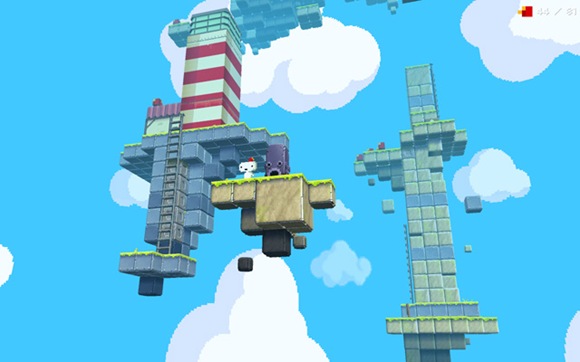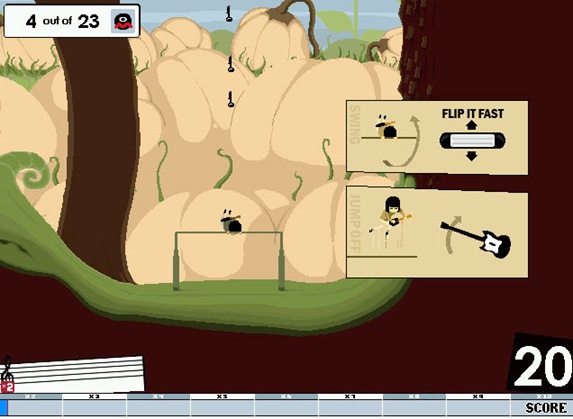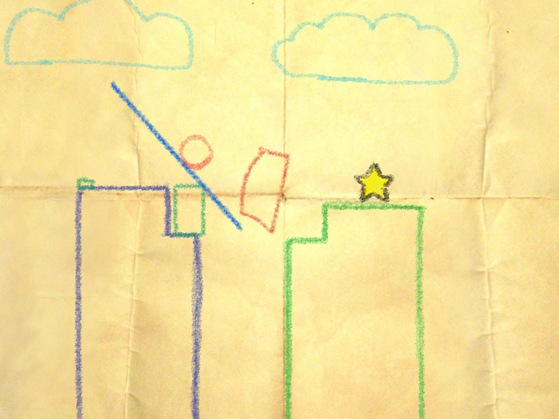Imagine this: you have a real-time interface that must be responsive and satisfying, simple enough to be approachable, but sophisticated enough that you’ll want to finely hone your skills over time. You’ll juggle a variety of elements to control with split-second accuracy, but even with elaborate mechanics under the hood, the whole thing, above all, has to be fun.
Sound familiar? It’s a description that’s equally apt for traditional music instruments and modern music software, as much as it is for games. The fact that, once they’re done, a game is often very not like familiar music software and instruments suggests the range of possible solutions to these design challenges. And suddenly, after years in which the games industry clung conservatively to tied and tested models, indie game designers with oddball game designs are grabbing the headlines. Some continue to tackle the meeting point of game and music making. Others offer inspiration for what futuristic 3D musical interfaces might look like.
I unfortunately didn’t make it to the game developer pow-wow that is GDC, but our friend Josh Randall at Harmonix tipped us off with these top picks. Given the blog buzz they’re earning, you may have seen some already, proving great independent game design may not be constrained to obscurity any longer.
Some games are playable on Windows now; Mac users may want to hit up Boot Camp, or watch for release on a console near you. (The pattern seems to be, prototype on PC but ship on consoles where better money can be made.)
Fez, pictured above, is here for two reasons. One, it promises some brilliant game mechanics. The Wii addition to the Paper Mario series from Nintendo suggested some of the game play mechanics of switching from 2D to 3D. Most of the actual execution only hinted at the possibilities. Fez goes further, with mind-bending shifts from two to three dimensions. Rather than see the lack of depth perception in imagined game worlds as a limitation, it makes it part of the game play — and reminds us of the gap in perception in 2D and 3D worlds, something that should raise the attention of anyone doing interface design (musical, sonic, or otherwise). The second reason is simple — the retro-tinged music score, apparently from producer/musician Jason DeGroot, sounds brilliant. Follow the game’s development at Kokoromi’s site:
Audiosurf perhaps got the most attention in the music games category. Pop in music from your collection, and race through a score generated by the music. It’s tough to resist this one at US$9.95 from Steam, especially for game music fans — the soundtrack from The Orange Box is included. The game is described thusly:
Audiosurf is a music-adapting puzzle racer where you use your own music to create your own experience. The shape, the speed, and the mood of each ride is determined by the song you choose. You earn points for clustering together blocks of the same color on the highway, and compete with others on the internet for the high score on your favorite songs.
And it’s got lots of extras: characters, strategy, and Steam Acheivements support. My only disappointment in this game is that the actual gameplay mechanic doesn’t deviate much from games we’ve already seen — though, then again, if you miss the design of Harmonix’s earlier Amplitude or Frequency from the days before Guitar Hero and Rock Band, this brings back the fun “interactive racer.” But I do hope that as indie developers come up with a truly interactive music remixer for the age of Ableton Live — and perhaps some fly mechanics that don’t come straight out of Wipeout XL. Not that either of those is likely to stop me from playing with Audiosurf, mind you.
PS – Audiosurf wins major extra points for being available now, which a lot of this other, tantalizing stuff is not.
With so many games focusing on making music into games, Fret Nice takes a different approach: it’s a platformer that allows you to play the game “as if it was a rock song.” Currently in prototype phase, it already looks terrific visually. Unlike Nintendo’s somewhat flawed attempt to do platformers with its bongo controller, the physical movement looks satisfying. And back to what this could mean for musicians, it is evocative of what could be possible with futuristic, interactive music scores.
Available now in an early-ish build for Windows, the frenetic Synesthete is perhaps the most ambitious of the games here as far as mechanics. Yes, some of the conventions of rhythmic music games are there — synchronized motions and falling bricks. But rather than resist that convention, Synesthete explodes it onto an isometric-projection gameboard, with power-ups and magical charm blasts and … well, have a look at the video. It looks as though you’ve jacked into the brain-powered computer system in Ghost in the Shell.
Crayon Physics is not a music game, but I’ll close on it because, like Fez, it’s notable for its soundtrack and its gameplay / interface design. The design has you solving puzzles by drawing physics-driven illustrations, as the name suggests — if you enjoyed our look at new music interfaces built in Processing, you’ll draw (ahem, sorry) plenty of inspiration from this. And, of course, it’s very possible to do stuff like this in Processing, Flash, and the like, and make a game that’s a musical or sonic interface. The music in question in this game demonstrates the potential of Creative Commons music, making use of a non-commercial license for the lovely Lullaby by _ghost on open music site ccMixter. Think that’s just giving your money away? Think again: many bands actually pay for exposure in big-budget games. In this case, the artist just got a load of publicity along with the game — and since it’s a non-commercial license, such things could lead to commercial collaborations in the future.
Oh, and most importantly, the game is fun. (The prototype is available, but a higher-quality game is forthcoming)
Crayon Physics @ Kloonigames (original prototype)
Crayon Physics Deluxe (the version shown at the Independent Game Festival)
Got some indie — or vintage, or otherwise — games that inspire you musically / interactively? Let us know.




